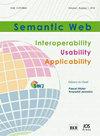Reuse of the FoodOn ontology in a knowledge base of food composition data
IF 2.9
3区 计算机科学
Q2 COMPUTER SCIENCE, ARTIFICIAL INTELLIGENCE
引用次数: 0
Abstract
We describe our work to integrate the FoodOn ontology with our knowledge base of food composition data, WikiFCD. WikiFCD is knowledge base of structured data related to food composition and food items. With a goal to reuse FoodOn identifiers for food items, we imported a subset of the FoodOn ontology into the WikiFCD knowledge base. We aligned the import via a shared use of NCBI taxon identifiers for the taxon names of the plants from which the food items are derived. Reusing FoodOn benefits WikiFCD by allowing us to leverage the food item groupings that FoodOn contains. This integration also has potential future benefits for the FoodOn community due to the fact that WikiFCD provides food composition data at the food item level, and that WikiFCD is mapped to Wikidata and contains a SPARQL endpoint that supports federated queries. Federated queries across WikiFCD and Wikidata allow us to ask questions about food items that benefit from the cross-domain information of Wikidata, greatly increasing the breadth of possible data combinations.在食品成分数据知识库中重用FoodOn本体
我们描述了将FoodOn本体与我们的食品成分数据知识库WikiFCD集成的工作。WikiFCD是与食品成分和食品项目相关的结构化数据知识库。为了重用食品的FoodOn标识符,我们将FoodOn本体的一个子集导入WikiFCD知识库。我们通过共享使用NCBI分类单元标识符来对齐进口,这些分类单元名称来源于食物的植物。重用FoodOn对WikiFCD有利,因为它允许我们利用FoodOn所包含的食物项分组。由于WikiFCD在食品项目级别提供食品成分数据,并且WikiFCD映射到Wikidata并包含一个支持联邦查询的SPARQL端点,因此这种集成在未来对FoodOn社区也有潜在的好处。跨WikiFCD和Wikidata的联合查询允许我们询问有关食品的问题,这些问题受益于Wikidata的跨域信息,极大地增加了可能的数据组合的广度。
本文章由计算机程序翻译,如有差异,请以英文原文为准。
求助全文
约1分钟内获得全文
求助全文
来源期刊

Semantic Web
COMPUTER SCIENCE, ARTIFICIAL INTELLIGENCEC-COMPUTER SCIENCE, INFORMATION SYSTEMS
CiteScore
8.30
自引率
6.70%
发文量
68
期刊介绍:
The journal Semantic Web – Interoperability, Usability, Applicability brings together researchers from various fields which share the vision and need for more effective and meaningful ways to share information across agents and services on the future internet and elsewhere. As such, Semantic Web technologies shall support the seamless integration of data, on-the-fly composition and interoperation of Web services, as well as more intuitive search engines. The semantics – or meaning – of information, however, cannot be defined without a context, which makes personalization, trust, and provenance core topics for Semantic Web research. New retrieval paradigms, user interfaces, and visualization techniques have to unleash the power of the Semantic Web and at the same time hide its complexity from the user. Based on this vision, the journal welcomes contributions ranging from theoretical and foundational research over methods and tools to descriptions of concrete ontologies and applications in all areas. We especially welcome papers which add a social, spatial, and temporal dimension to Semantic Web research, as well as application-oriented papers making use of formal semantics.
 求助内容:
求助内容: 应助结果提醒方式:
应助结果提醒方式:


